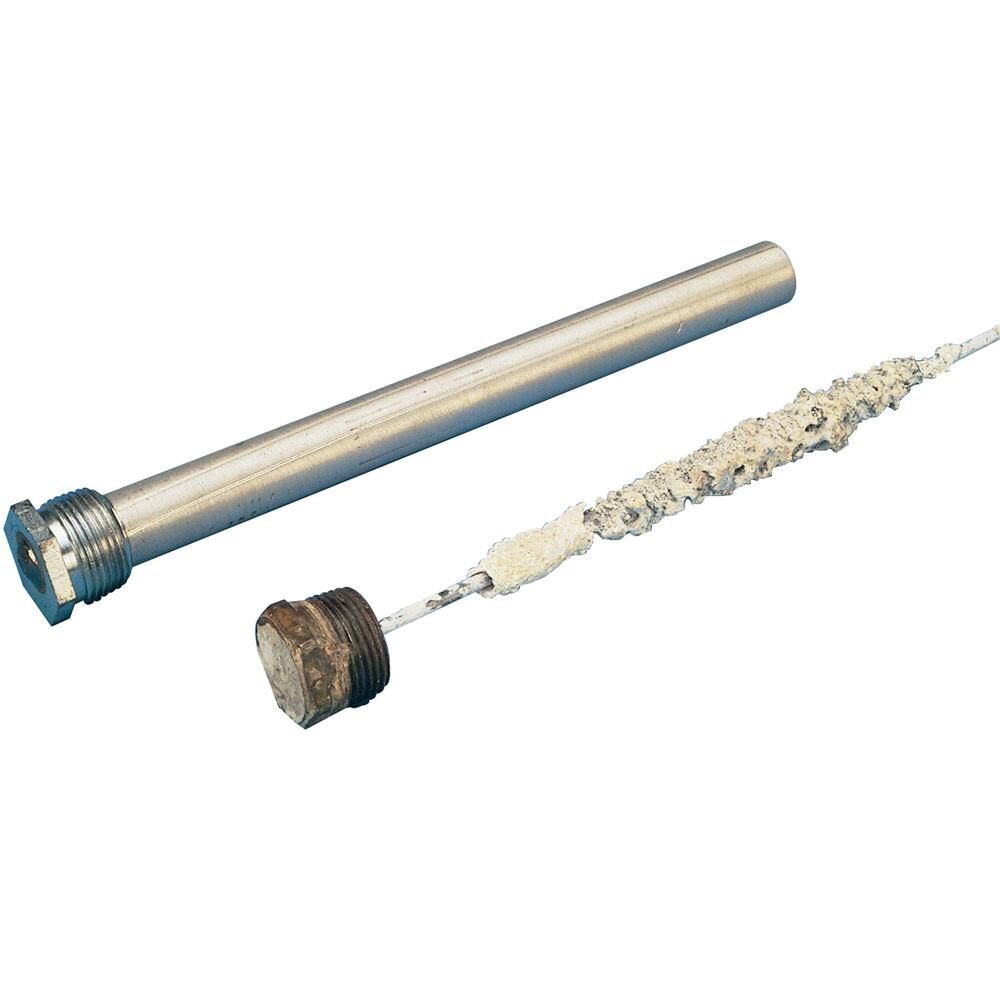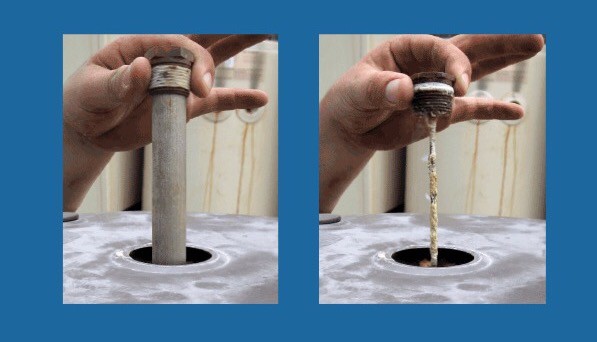A water heater is a must-have appliance in many homes across the country. For many, the thought alone of going for a cold shower in the morning sends shivers up their spine. If you always want a functioning water heater available, the anode rod inside of it must be in good condition.
But what is the anode rod, and why is it something you need to know if you own a water heater? Those are some of the questions we’ll be tackling in this article.
By the end of this article, you’ll have a newfound appreciation for the anode rod in your water heater. You’ll also pick up some tips that will come in handy when it comes to monitoring and replacement.
Without further ado, let’s talk more about the anode rod.
What Is an Anode Rod?
Let’s start by defining what an anode rod is. Upon closer inspection, you’ll see that it is a steel core wire usually wrapped up in metal.
You can use different kinds of metal to wrap up the anode rod, and they have a noticeable effect on the performance of this component. The metals often are aluminum, magnesium, and zinc. We’ll get into how these different materials affect performance later in this article.
The anode rod is somewhere near the top of the water heater tank. The rod springs into action as soon as the tank fills with water.
So, what does an anode rod do inside the water heater? The fact that it is also often referred to as the “sacrificial anode rod” or the “sacrificial lamb” should tip you off to its role.
The Role of the Anode Rod
Your home’s plumbing system – including your heater – features a complex network of metal pipes, tanks, and of course, water. As we all know, though, metal and water don’t interact well with one another. That’s mainly because water has a corrosive effect on metal that compounds over time.
This article from Plumbing Supply goes deeper into the matter by pointing out that a process known as galvanic corrosion is taking place inside your water heater. The process involves one metal corroding preferentially to another metal as they both sit submerged in an electrolyte. In this case, the electrolyte in question is the water that has different substances dissolved in it.
If you allow the metal pipes and the metal tank to sit in the water continuously, they will eventually rust and break. Instead of enjoying hot water coming from your heater, you’ll be lucky if it remains operational for a couple of years.
This is where the anode rod comes in.
Most pipes and water tanks are steel. As we noted earlier, they wrap anode rods in metals like aluminum, magnesium, or zinc.
It’s important to note that difference in composition because the metals used to wrap anode rods are less reactive than the steel in the pipes and tanks. That difference is crucial, and it will lead to the less reactive metals corroding first.
Basically, the anode rod will be sacrificed so that the tanks and pipes will remain intact longer.
That’s not all the anode rod does. As it continues to corrode, the anode rod also releases electrons into the water. These electrons help keep the other metal components of the water heater system intact longer.
How Long Will an Anode Rod Last inside a Water Heater?
Anode rods won’t last forever inside your water heater. By design, they are supposed to corrode and be rendered useless after some time. How long it will take for that to happen depends on a variety of factors.
Water Hardness
Hardness is a quality that refers to the amount of mineral content in the water. The more minerals in the water, the harder it will be.
When it comes to corrosiveness, hard water is not a concern. It may even increase the longevity of the metals included in your plumbing system.
The greater threat to the integrity of the metals in the system is soft water. Naturally soft water is more corrosive because it has a low TDS (total dissolved solids) content and a low pH level. If the water flowing through your home is naturally soft, expect your anode rod to have a shorter shelf life.
Frequency of Use
Another factor that will determine how long the anode rod will remain functional is how often you use the water heater since heating the water speeds up the corrosion process. What that means is that you’ll need to replace the anode rod sooner the more you use your water heater.
Exposure to Water
Homeowners who like keeping their tanks mostly full will need to replace their anode rods earlier. With the anode rods exposed to water more often, it’s only natural for them to corrode faster.
Maintenance
How diligently you maintain your water heater will also affect the longevity of the anode rod. It’s good to clean up the water heater regularly so that the conditions are as good as they can be for all the included components.
The reality is that even if you have hard water at home, maintain your heater regularly, and try to protect the anode rod as much as possible since it will still succumb to corrosion after a few years. The smart move here is to check on the rod when it’s two years old and see if it’s still getting the job done. Even on the high end, anode rods only remain functional for about five years.
How Do You Check on an Anode Rod?
Checking on your water heater’s anode regularly is a good idea, but how exactly do you go about doing that?
First, you should look for your water heater’s manual. That will usually indicate where the rod is placed and probably even tell you how to remove it.
As noted previously, most anode rods are near the top of the heater. Anode rods may also be closer to the hot water outlet.
Getting the anode rod out of the water heater is not an easy task to do on your own. You may want to call for professional assistance.
What Are the Signs of a Deteriorating Anode Rod?
There are different ways to tell if you need to replace your anode rod. Some of them require you to inspect the anode rod and/or the heater itself. The other signs will make their presence felt even if you’re not in the vicinity of the water heater.
The Deteriorated Appearance of the Anode Rod
Before you run the heater for the first time, it may not be a bad idea to take a quick photo of the anode rod. That photo can serve as a reference point when you check on the anode rod in the future.
When an anode rod is still in good condition, it will appear solid and even shiny as you would expect anything made from metal. Over time, the metal will corrode and start to fall apart. It will likely become discolored and rusty as well.
You’ll know the time is right to replace the anode rod when it appears thin and rusted over.
The Water Coming from the Heater Has an Unusual Odor
If you have a water heater installed at home, it’s not unusual for the water flowing through your pipes to sometimes take on an unusual odor. Take that a sign that something’s wrong.
The first type of unusual odor to worry about is a rusty smell. This could be a sign that the rusty anode rod is now soaking into the water. It could also be an indicator that the rod is bobbing around in the water after coming loose.
The other type of unusual odor that may permeate the water is a rotten egg smell. This foul odor is likely the result of the water reacting with either the aluminum or the magnesium used to cover the anode rod.
The foul-smelling water is not dangerous or anything, but you probably don’t want to wash your body using something with that odor. You should replace it at this point.
The Water Coming from the Heater Looks Unusual
It’s not only the smell of the water that you need to monitor because even its appearance may change.
A rusted out anode rod can cause the water to look discolored and rusty. The color will look somewhat reddish or brownish.
You may also notice that the water coming from the heater looks thicker, with a consistency comparable to a gel-like substance. That unusual substance is aluminum oxide. More often than not, the aluminum oxide will stay in the tank, but it can escape into other parts of your home on occasion.
The Water Heater Is Leaking
Water heaters leak for different reasons. Among the possible explanations of leakage is a busted anode rod.
When the anode rod is rusty, it can fall into the water and start moving around in there. On occasion, it may hit the walls of the water tank and cause cracks to form. If those cracks become big enough, they will spring leaks.
The Water Heater Is Making a Rattling Noise
Unusual sounds may also start emanating from your water heater if there’s something wrong with the anode rod. That’s likely because the anode rod itself is the one causing the noise. It may be rattling around inside the tank now that it has broken loose.
Don’t disregard those noises when you start hearing them as they could be the signs you need to do something soon.
Which Type of Anode Rod Should You Choose?
Let’s assume that the time has come for you to replace the anode rod in your water heater. The question now is: Which type of anode rod should you get?
You have three options to choose from here, and they are aluminum rods, magnesium rods, and zinc rods. Let’s talk about how they differ from one another.
Aluminum Anode Rods
You can find aluminum anode rods easily. These are great to use if your home has hard water as they hold up remarkably well to the mineral content.
Of course, placing an aluminum anode rod can lead to your water smelling off and looking weird if you neglect it.
Zinc Anode Rods
The zinc anode rods are pretty similar to the aluminum variants. In fact, they also contain a good amount of aluminum.
The zinc rods function like the aluminum rods in the sense that they are for homes with hard water. The only real difference is that the zinc used in these anode rods prevents the emergence of that rotten egg odor.
Magnesium Anode Rods
Last up are the magnesium anode rods, and these are the ones you want to have inside your heater if your home has soft water. You can use these magnesium rods in homes with hard water, but they won’t last as long as their aluminum or zinc counterparts.
How Do You Replace the Anode Rod?
The water heater is not an appliance you can do without for an extended period of time. You need it working to shower comfortably.
If it’s acting up, you will likely want to repair it right away, but know that doing so will be a challenge. According to Angie’s List, you’ll need specialized tools to extract the anode rod from its position, and it can also be tough to reach.
Try to remove the anode rod on your own, and you could end up damaging the water heater. It would be wiser to spend money enlisting professional help instead of buying a new heater due to the errors you made.
Whether you’ve encountered problems related to the anode rod or other issues affecting your plumbing, we at San Diego Plumbing & Pipelining are ready to help. Reach out to us today to learn more about the services we provide and fix those nagging plumbing issues!









